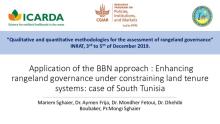Land Library
Welcome to the Land Portal Library. Explore our vast collection of open-access resources (over 74,000) including reports, journal articles, research papers, peer-reviewed publications, legal documents, videos and much more.
/ library resources
Showing items 1 through 9 of 381.The articles in this Bulletin are written by the following organizations and individuals: National Coordinator for the Defense of the Mangrove Ecosystem (C-CONDEM), Ecuador; Yayasan Pusaka Bentala Rakya (Bentala Raya Heritage Foundation), Indonesia; Venezuelan Observatory of Political Ecology and
The local cost-effective, raised-bed machine for small-scale farmers has been developed by ICARDA and its national partners to promote the adoption of raised-bed technology at a larger scale.
The presentation discusses the application of the Bayesian Belief Network (BBN) approach to enhance rangeland governance under constraining land tenure systems in the South of Tunisia.
This Template is designed for standardized description of Sustainable Livestock Management Options by Context (SLiM OxC), in which sustainable livestock management option and its social, economic and ecological contexts are systematically characterized.
With only 7 percent of agricultural land, Tajikistan is a mountainous country located at the heart of Central Asian region, prone to desertification, salinization, soil erosion and forest loss.
Располагая лишь 7 процентами земель, используемых в сельском хозяйстве, горный Таджикистан расположен в центре региона Центральной Азии, подверженного опустыниванию, засолению,
Despite the many advantages of sustainable intensification (SI), the level of adoption of SI practices in African smallholding farms is still very low, posing the need for adequate methods for monitoring farm sustainability.
SLM CoP Presentation given by Tatenda Lemann at the SKIM Regional Workshop in Rabat, Morocco November 14th, 2019.
This is a presentation on the functionally context socio-ecological type (fCSET) approach to support out-scaling of agricultural innovation options, and empirical analysis across three Maghreb countries (Tunisia, Algeria and Morocco).







